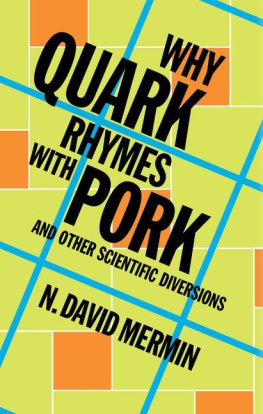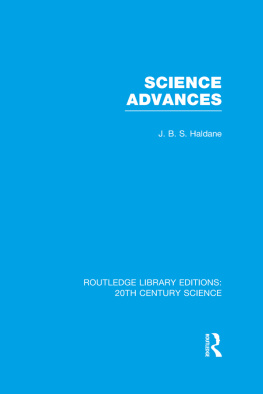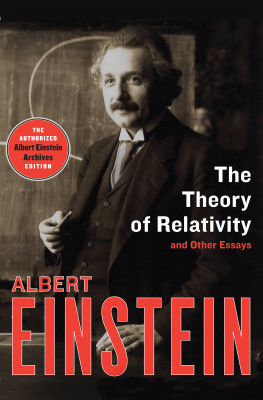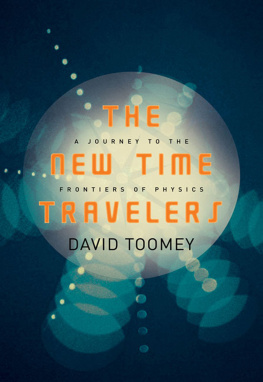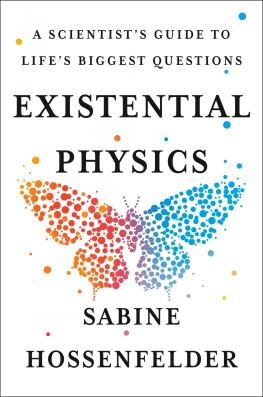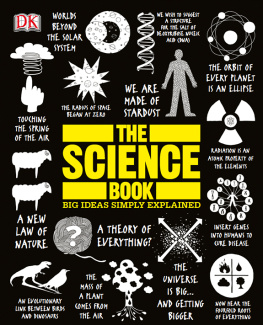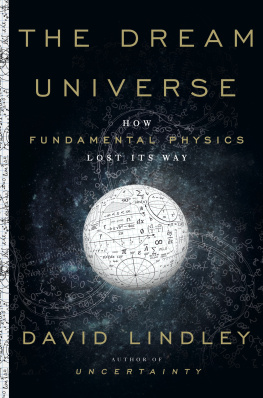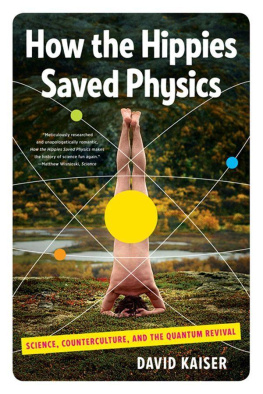A collection of offbeat and entertaining primarily nontechnical essays on physics and those who practice it, from eminent theoretical physicist N. David Mermin. Bringing together for the first time all thirty of his columns published in Physics Today s Reference Frame series from 1988 to 2009, with updating commentary, this humorous and unusual volume includes thirteen other essays, many of them previously unpublished.
Mermins lively and penetrating writing illuminates a broad range of topics, from the implications of bad spelling in a major science journal, to the crises of science libraries and scientific periodicals, the folly of scientific prizes and honors, the agony of getting funding, and how to pronounce quark. His witty observations and insightful anecdotes gleaned from a lifetime in science will entertain physicists at all levels as well as anyone else interested in science or scientists at the turn of the 21st century.
N. David Mermin is Horace White Professor of Physics Emeritus at Cornell University. He is known throughout the scientific world as co-author of Solid State Physics (Ashcroft and Mermin) and for his columns in Physics Today . He was awarded the first Julius Edgar Lilienfeld Prize of the American Physical Society for outstanding contributions to physics in 1989, and is a member of the American Philosophical Society, the U.S. National Academy of Sciences, and the American Academy of Arts and Sciences.
N. David Mermin
University Printing House, Cambridge CB2 8BS, United Kingdom
Cambridge University Press is part of the University of Cambridge.
It furthers the Universitys mission by disseminating knowledge in the pursuit of education, learning and research at the highest international levels of excellence.
www.cambridge.org
Information on this title: www.cambridge.org/9781107024304
Cambridge University Press 2016
This publication is in copyright. Subject to statutory exception and to the provisions of relevant collective licensing agreements, no reproduction of any part may take place without the written permission of Cambridge University Press.
First published 2016
Printed in the United States of America by Sheridan Books, Inc.
A catalogue record for this publication is available from the British Library
Library of Congress Cataloguing in Publication data
Names: Mermin, N. David, author.
Title: Why quark rhymes with pork, and other scientific diversions / N. David Mermin.
Description: Cambridge, United Kingdom; New York, NY : Cambridge University
Press, 2016. | 2016 | Brings together all his columns published in Physics Today,
19882009, with thirteen related essays, many previously unpublished. | Includes
bibliographical references and index.
Identifiers: LCCN 2015027874| ISBN 9781107024304 (hb : alk. paper) |
ISBN 1107024307 (hb : alk. paper)
Subjects: LCSH: PhysicsPopular works. | SciencePopular works.
Classification: LCC QC71.M373 2016 | DDC 530dc23
LC record available at http://lccn.loc.gov/2015027874
ISBN 978-1-107-02430-4 Hardback
Cambridge University Press has no responsibility for the persistence or accuracy of URLs for external or third-party internet websites referred to in this publication, and does not guarantee that any content on such websites is, or will remain, accurate or appropriate.
for Hannah and Sam and Ivo
Contents
Preface
Sometime in the mid-1980s Gloria Lubkin, the editor of The first described my successful effort to make the ridiculous word boojum an internationally accepted scientific term. The second gave a very elementary way of thinking about Bells Theorem and its implications for our understanding of quantum mechanics. These apparently suggested to Gloria that Id make a good columnist.
I wasnt so sure. Having to produce something clever and entertaining at regular intervals was not my style. On the occasions when Id managed to do it, it seemed like a small miracle, unlikely ever to happen again. So while I didnt say no, I kept stalling. A couple of years went by.
Then one day I discovered that Frank Wilczek.
After that Gloria would phone every few months requesting more miracles. Somehow she managed to induce them. I came to regard her as my Muse. For 21 years she extracted essays I didnt know were in me. She criticized first drafts and negotiated final versions. As some of these essays reveal, my relations with editors have often been tense, but working with Gloria was always a pleasure. She knew exactly how to do her job, and she knew how to get me to do mine.
In 2009 Gloria Lubkin retired from Physics Today and the Reference Frame columns came to an end. I found to my surprise that I had produced thirty of themone every eight issues. Not all were miracles, but surprisingly many were. As I traveled around the world of physics after 1988, giving talks at universities and conferences, I discovered that I was becoming better known for my columns than for my technical scientific papers or textbooks. People wanted to talk to me about the columns. And they remembered some from years earlier.
In 2011 I decided to put them all into a book, and Simon Capelin at Cambridge University Press agreed to publish it. My plan was to write a foreword and an afterword for each of the thirty, setting the stage, clarifying the historical context, providing pedagogical background for the occasional technical ones, and describing the letters they elicited to Physics Today and to me. This project started off well and then bogged down. Producing thirty such overviews was less fun and was taking longer than I had anticipated. In 2012 everything ground to a halt. I had found an interpretation of quantum mechanicsthe QBism of Chris Fuchs and Rdiger Schackthat finally made sense of the subject. I set the book aside to write about my epiphany.
In 2014 I ran into an old friend, Leonid Levitov, who had been a postdoc at Cornell as my career as a columnist was getting underway, and is now a professor at MIT. He lamented the disappearance of Reference Frame and asked whether I had thought of collecting my columns into a book. I explained that indeed I had, but I found it harder than I expected to write forewords and afterwords for each column. He shook his head. David, he reprimanded me, poems do not have forewords and afterwords. Just like that the shackles that had tied me down for three years crumbled into dust. I told Fuchs and Schack that I was taking a sabbatical from quantum foundations, turned down all invitations to write and lecture about QBism, and finished my book.
My paralyzing, unpoetic forewords and afterwords have all condensed into brief postscripts. I have added to the columns in celebrate the importance of writing. Together they serve as my benediction to this whole collection.
I thank Simon Capelin for his understanding patience, and Leonid Levitov for getting me unstuck. Thanks also to Joan Feynman and Geoffrey Pullum for letting me reproduce their delightful letters.
Above all, Im profoundly grateful to Gloria Lubkin for over two decades of wonderful collaboration.
E Pluribus Boojum: The Physicist as Neologist, Physics Today , April 1981, 4653.
Part One Reference Frame Columns, Physics Today 19882009

